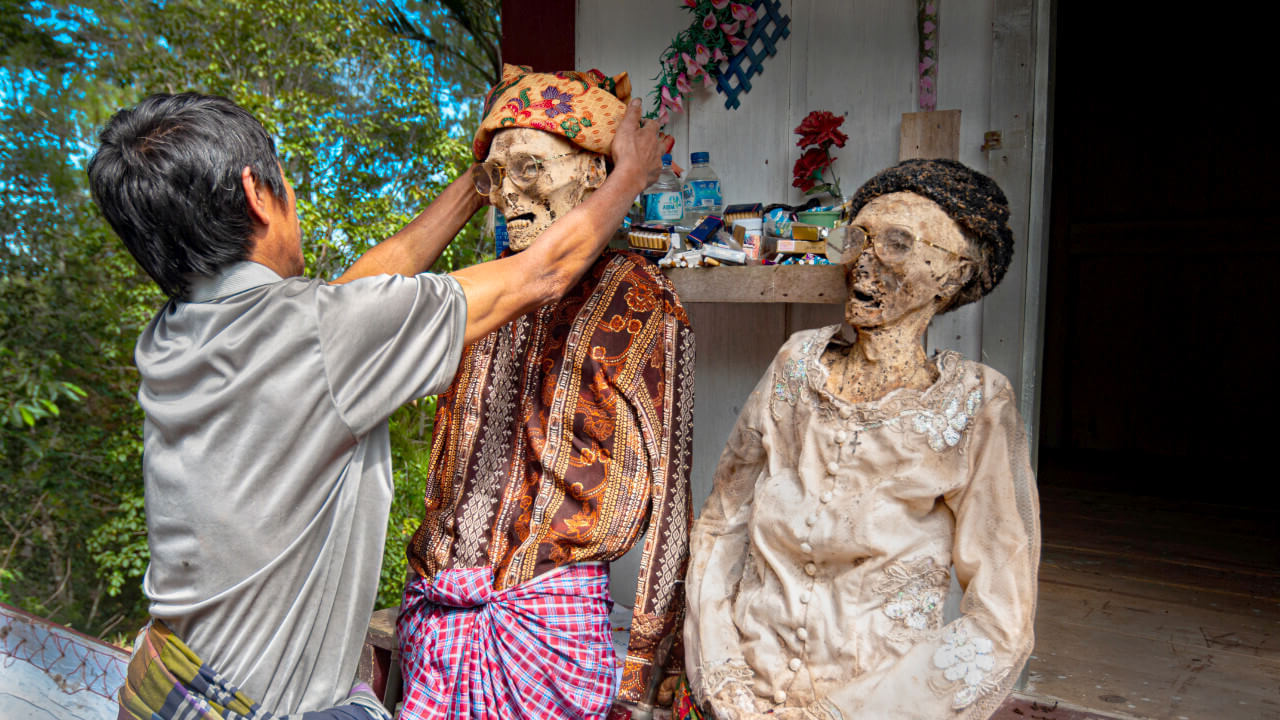
Toraja death rituals are some of the most unique and intricate ceremonies in the world. These traditions, practiced by the Toraja people of Indonesia, are deeply rooted in their culture and beliefs about the afterlife. Why are these rituals so important? They reflect the Toraja's view that death is not an end but a transition to another realm. The ceremonies can last for days, involving elaborate preparations, animal sacrifices, and community gatherings. What makes them stand out? The Toraja build elaborate tombs carved into cliffs and mountains, creating a stunning visual spectacle. These rituals are not just about mourning but celebrating life and ensuring the deceased's smooth passage to the afterlife. Curious to learn more? Let's dive into 37 fascinating facts about these extraordinary traditions.
Key Takeaways:
- The Toraja people of Indonesia have unique death rituals that involve elaborate funeral ceremonies, animal sacrifices, and mummification, reflecting their deep spiritual beliefs and community support.
- Toraja funerals have significant social and economic impacts, attracting tourists, strengthening community bonds, and showcasing the family's wealth and status through the scale of the ceremonies.
Toraja Death Rituals: A Unique Cultural Practice
The Toraja people of Indonesia have some of the most fascinating and intricate death rituals in the world. These customs are deeply rooted in their beliefs and traditions, making them a captivating subject to explore.
-
Toraja people believe death is a gradual process. They view it as a journey rather than an abrupt end, which influences their elaborate funeral ceremonies.
-
Funerals can last several days. These events are not just a single-day affair but can extend over a week, involving various rituals and ceremonies.
-
Buffalo sacrifices are common. The Toraja believe that buffaloes help transport the deceased's soul to the afterlife, so they sacrifice many during funerals.
-
The number of buffaloes sacrificed signifies status. Wealthier families sacrifice more buffaloes, showcasing their social status and honoring the deceased.
-
Rambu Solo is the name of the funeral ceremony. This elaborate event includes dances, music, and sacrifices, reflecting the community's respect for the deceased.
-
Funerals are a community affair. Everyone in the village participates, contributing food, money, and support to the grieving family.
-
The deceased are kept at home before burial. Bodies are preserved with formaldehyde and kept in the family home for weeks, months, or even years.
-
Mummification is practiced. This ancient technique helps preserve the body until the family can afford a proper funeral.
-
Burials take place in cliffs. The Toraja carve out tombs in cliffs or large rocks, believing it brings the deceased closer to the heavens.
-
Tau tau effigies guard the tombs. These wooden statues represent the deceased and are placed outside the tombs to protect their spirits.
The Role of Animals in Toraja Funerals
Animals play a significant role in Toraja death rituals, symbolizing various aspects of their beliefs about the afterlife.
-
Pigs are also sacrificed. Besides buffaloes, pigs are commonly sacrificed during funerals to honor the deceased.
-
Chickens are used in rituals. Chickens are often sacrificed to appease spirits and ensure a smooth journey for the deceased's soul.
-
Buffalo horns are displayed. The horns of sacrificed buffaloes are displayed on the family's home as a sign of respect and status.
-
Animal sacrifices are believed to cleanse the soul. The Toraja think these sacrifices help purify the deceased's soul, preparing it for the afterlife.
-
Buffaloes are considered sacred. These animals hold a special place in Toraja culture, symbolizing strength and prosperity.
-
Animal blood is used in rituals. The blood of sacrificed animals is often used in various ceremonies to honor the deceased.
-
Animal sacrifices are a form of communication. The Toraja believe these sacrifices help communicate with the spirits of their ancestors.
The Spiritual Beliefs Behind Toraja Death Rituals
The Toraja's death rituals are deeply intertwined with their spiritual beliefs, reflecting their unique perspective on life and death.
-
Aluk Todolo is the traditional religion. This ancient belief system guides the Toraja's rituals and ceremonies, including their death practices.
-
The afterlife is called Puya. The Toraja believe that the soul travels to Puya, a spiritual realm where the deceased continue their existence.
-
Spirits are believed to linger. The Toraja think that the spirits of the deceased remain close to their families until the proper rituals are performed.
-
Ancestor worship is common. Honoring ancestors is a crucial aspect of Toraja culture, influencing their elaborate funeral practices.
-
Rituals ensure a smooth journey to the afterlife. The various ceremonies and sacrifices are meant to help the deceased's soul transition smoothly to Puya.
-
The soul's journey is seen as a communal responsibility. The entire community participates in the rituals, reflecting their collective belief in supporting the deceased's journey.
-
Death is seen as a transformation. The Toraja view death as a transformation rather than an end, influencing their intricate death rituals.
The Social and Economic Impact of Toraja Funerals
Toraja funerals are not just spiritual events; they also have significant social and economic implications for the community.
-
Funerals are a major financial investment. Families often spend years saving money to afford the elaborate ceremonies and sacrifices.
-
Wealth is displayed through funerals. The scale of the funeral and the number of sacrifices reflect the family's wealth and social status.
-
Funerals can attract thousands of attendees. These events draw large crowds, including family members, friends, and even tourists.
-
Tourism is influenced by these rituals. The unique death rituals of the Toraja attract many tourists, boosting the local economy.
-
Funerals strengthen community bonds. The communal nature of the rituals helps reinforce social ties and support networks within the village.
-
Artisans benefit from funeral preparations. Local craftsmen create the tau tau effigies and other ceremonial items, providing them with a source of income.
-
Funerals can lead to debt. The high cost of these elaborate ceremonies can sometimes push families into debt, reflecting the economic pressure of maintaining cultural traditions.
Modern Influences on Toraja Death Rituals
While the Toraja maintain many of their traditional practices, modern influences have also impacted their death rituals.
-
Christianity has influenced some rituals. Many Toraja have converted to Christianity, blending their traditional practices with Christian elements.
-
Modern embalming techniques are used. The use of formaldehyde and other modern embalming methods helps preserve bodies for extended periods.
-
Tourism has led to changes. The influx of tourists has influenced some aspects of the rituals, making them more accessible to outsiders.
-
Media exposure has increased awareness. Documentaries and articles about Toraja death rituals have brought global attention to these unique practices.
-
Economic changes affect funeral practices. As the local economy evolves, some families may alter their funeral practices to adapt to new financial realities.
-
Cultural preservation efforts are ongoing. Despite modern influences, many Toraja are dedicated to preserving their traditional death rituals for future generations.
The Final Word on Toraja Death Rituals
Toraja death rituals are a fascinating blend of culture, tradition, and spirituality. These ceremonies, which can last for days, showcase the Torajan people's deep respect for their ancestors. From elaborate funerals to the unique practice of Ma'nene, where they clean and dress the bodies of the deceased, these rituals are a testament to their beliefs about life and death.
Understanding these customs gives us a glimpse into a world where death is not feared but celebrated as a part of life's journey. The Torajans' approach to death reminds us of the importance of honoring our loved ones and the traditions that connect us to our past.
If you ever get the chance to witness these rituals, you'll see firsthand the rich cultural heritage that makes the Toraja people unique. It's a powerful reminder of the diverse ways humans find meaning in life and death.
Frequently Asked Questions
Was this page helpful?
Our commitment to delivering trustworthy and engaging content is at the heart of what we do. Each fact on our site is contributed by real users like you, bringing a wealth of diverse insights and information. To ensure the highest standards of accuracy and reliability, our dedicated editors meticulously review each submission. This process guarantees that the facts we share are not only fascinating but also credible. Trust in our commitment to quality and authenticity as you explore and learn with us.


